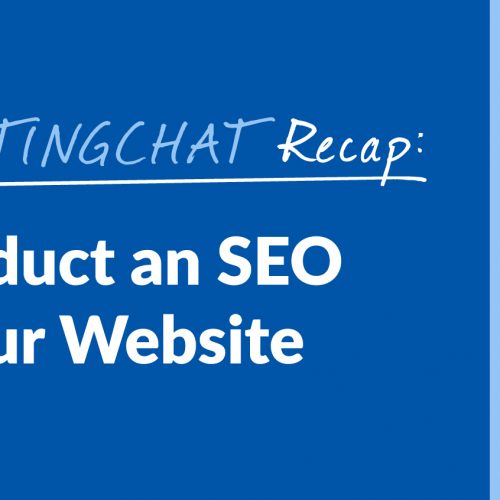#ContentWritingChat Recap: How to Conduct an SEO Audit with Lexie Kimball of Netvantage Marketing
Have you ever conducted an SEO audit for your website? If not, you should! However, if you’ve never done one before, you might be wondering how to get started… If you’re in that boat, there’s no need to worry! That’s exactly what we talked about in this week’s #ContentWritingChat. And as always, our participants had some amazing advice to share. If you’re ready to turn your website into one that Google loves, keep reading for the valuable tips! #ContentWritingChat Recap: How to Conduct an SEO Audit for Your Website with Lexie Kimball of Netvantage Marketing Join us for #ContentWritingChat on Tuesday, September 26th to learn how to conduct an #SEO audit for your site with Lexie of @netvantage! ? pic.twitter.com/kPvQArxxwu — Express Writers (@ExpWriters) September 19, 2017 Our guest host this week was Lexie Kimball of Netvantage Marketing. Lexie is their account manager and she really knows her stuff when it comes to SEO! As a frequent #ContentWritingChat participant, it was great having her step into a guest hosting role. Q1: Share the basic process you go through for an on-site SEO audit. If you’ve never conducted an SEO audit before, you’ll need to know where to begin. To help you out, our chat participants shared some essential steps the process includes. Here’s what you need to know: A1: The first step of an audit is keyword research. We use that keyword research for page titles, metas & body copy. #contentwritingchat — Netvantage Marketing (@netvantage) September 26, 2017 A1.2: We also do a technical audit of the website to check for potential red flags @Google won’t like. #contentwritingchat — Netvantage Marketing (@netvantage) September 26, 2017 Lexie’s first step in conducting an SEO audit is keyword research. As she mentioned, the chosen keyword for a piece of content goes in page titles, meta descriptions, and body copy. The team at Netvantage also does a technical audit of the website to locate any red flags. A1: In a nutshell: Discussion with client, keyword research, on-site recommendations, implementation of changes. #contentwritingchat — Michael Hall (@allmikehall) September 26, 2017 Michael, also from the Netvantage team, knows that chatting with your client first is a must. It’s important to understand their business and needs. He then suggestions moving on to keyword research, on-site recommendations, and implementation of changes. A1: My basic SEO process- 1. Google the site 2. Use analytics to ID keywords 3. Start looking at specific pages#ContentWritingChat pic.twitter.com/2ZAFZ5xB6r — Mallie Rust (@malliefe2o3) September 26, 2017 Mallie starts by Googling the site, using analytics to identify keywords, and then she looks at specific pages. A1: We start by running the site thru @screamingfrog, then perform our UX/design/technical/mobile-friendly/etc. audit.#ContentWritingChat https://t.co/O4ysptZmpm — ThinkSEM (@ThinkSEM) September 26, 2017 Sarah and the team at ThinkSEM start by running the site through Screaming Frog before moving forward with other key steps. A1: I use @semrush to check out where my website stands and take their suggestions into consideration. #ContentWritingChat — Sarah Nelson (@Blogging_Geek) September 26, 2017 SEMrush is a go-to tool for Sarah! She takes the tool’s suggestions into consideration. A1. Have a clear understanding of your goals and target audience. Start with a plan. #contentwritingchat — YourWebContentWriter (@WebContent4U) September 26, 2017 It’s also important to have an understanding of your goals/your client’s goals and who the target audience is. From there, you can create an effective plan. A1 FIRST step: Talk to your client and outline solid KPIs you’re judging content by when auditing. #ContentWritingChat — Julia McCoy ? (@JuliaEMcCoy) September 26, 2017 A1 2: Use @screamingfrog to grab ALL site links. Do manual checks across all the content per KPIs. It’ll take a while. #ContentWritingChat — Julia McCoy ? (@JuliaEMcCoy) September 26, 2017 For Julia, she feels talking to the client is the first step. This allows you to outline solid KPIs you’re judging content by when auditing. From there, she also likes to use Screaming Frog to grab all site links. Q2: Where do you start with keyword research? When it comes time to conduct keyword research, where do you begin? Check out this great advice from Tuesday’s chat: A2: We always ask clients first. They know their business the best & have the best suggestions for keywords. #ContentWritingChat — Netvantage Marketing (@netvantage) September 26, 2017 A2.2: We also ask them for their competitors. Looking at competitor’s sites is another great way to look for keywords. #contentwritingchat — Netvantage Marketing (@netvantage) September 26, 2017 To get started with keyword research, Lexie knows it’s important to talk to the client before beginning. Because the client has plenty of knowledge on their business, they’re able to provide some great suggestions for keywords. She also suggests looking at competitors to see which keywords they’re using and ranking for. A2: A consultation with the client. We question them on their ideal clients/products or services, etc. #ContentWritingChat https://t.co/bsBm7zqaML — ThinkSEM (@ThinkSEM) September 26, 2017 A consultation with the client is a must for Sarah! Sarah and her teammates use that opportunity to question the client on their ideal audience, products, and services. A2: Ask client to provide a list of what they consider high priority keywords. It helps our KW research stay relevant. #contentwritingchat — Michael Hall (@allmikehall) September 26, 2017 Michael knows it’s helpful to ask the client to provide a list of keywords that are high priority. After all, they likely have a good idea of which ones are best for their business. A2: We interview clients & their clients. G Trends is a place to start, and Keyword Planner (https://t.co/1hcNesBoNM) #contentwritingchat — Ray Sidney-Smith (@w3consulting) September 26, 2017 For Ray, it all starts with interviewing the client. Then, he moves onto tools like Google Trends and Google Keyword Planner. A2 Start by defining which keywords you want your site to rank for. Then, record your ranking for each one. #contentwritingchat — Dennis Shiao ✍️ (@dshiao) September 26, 2017 Dennis knows it’s important to define which keywords you want your site to rank for. You can then record … Read more


